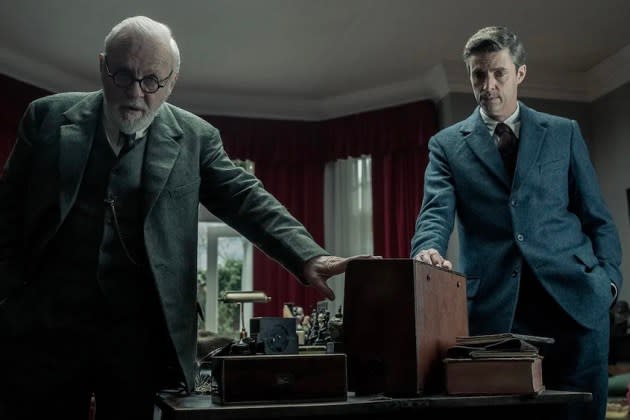‘Freud’s Last Session’ Review: Anthony Hopkins Slips Easily Into Sigmund’s Skin in Talky Two-Hander
- Oops!Something went wrong.Please try again later.
- Oops!Something went wrong.Please try again later.
- Oops!Something went wrong.Please try again later.

Sometimes a cigar is just a cigar. And sometimes it’s a loaded symbol in an imagined conversation between world-famous “sex doc” Sigmund Freud (played by Anthony Hopkins, in irritable curmudgeon mode) and converted atheist C.S. Lewis (Matthew Goode, looking slightly worse for wear).
In the stage play turned only-slightly-less-stagy film, “Freud’s Last Session,” these two titans of 20th-century thought meet at the psychoanalyst’s London home in early September 1939 to discuss God, father figures (both spiritual and biological) and, of course, sex. Freud famously had a way of making everything about sex, and once he lights his cigar — a prop that Freud treats every bit as portentously as one might Chekhov’s proverbial gun — the subject effectively chases out their more gripping disagreement over faith.
More from Variety
Expanding only slightly on the stuffiness of his tweedy 2015 biopic, “The Man Who Knew Infinity,” director Matthew Brown has taken the play by Mark St. Germain and whittled away a bit of the talk (thereby making room for formative memories from their respective childhoods). Trouble is, where a fictional tête-à-tête between Freud and Lewis is concerned, sparkling talk is precisely what audiences have paid to experience.
In “The Two Popes” — another Hopkins two-hander — the ping-ponging of Big Ideas proved perfectly electrifying, whereas here, Freud’s on offense for most of the movie, while Lewis is too polite to take the bait. As a result, this feels less like a racket sport than juggling, as Brown introduces flashbacks and other distractions (including a few impressive trench-warfare scenes from Lewis’ military service), repeatedly cutting away to whatever Freud’s daughter Anna might be doing at just the moment he’s established some momentum between these two minds.
The movie takes the liberty of luring Lewis to Freud’s inner sanctum, then puts the psychoanalyst on his own chaise longue, as an advanced case of mouth cancer has him reaching for the morphine every few minutes — either that or gazing on the bright orange pill with which he plans to commit suicide. (In one of the literate script’s more poetic conceits, the film imagines that Freud passed the same pill to his daughter when she was detained by Nazi officers.)
Few people have had a greater impact on the way we think about the way we think than Freud, and yet, the average person doesn’t know nearly as much about the man’s own biography. Do they know how and when he died, for instance? Are they aware that the man who identified the Oedipus complex had such a complex and codependent relationship with his own daughter? Do they know that Anna was a lesbian, as well as a noted psychoanalyst?
These details, all fascinating, are packed into a film that really ought to have remained a focused dialogue between Freud and Lewis. The latter actually takes Freud’s dog, Jofi, out for a walk at one point so the movie can multitask a few of its other threads. Toward the end, as the God-focused debate reaches something of a stalemate, the subplot about Anna and her fixation on father Sigmund (described here as “attachment disorder”) takes over, adding a sense of closure.
After all, it’s not as if Freud is going to convince Lewis (whom he likely never met in real life) to abandon Christianity, any more than Lewis is likely to convert Freud just before his death. The film takes neither side, respecting both men’s beliefs and giving them each elegantly worded arguments to support their positions. “We’ve never matured enough to overcome the terror of being in the dark,” Freud argues, implying that humankind’s belief in God reduces to a fear of death — an end he awaits with apparent relief, given the rise of Adolf Hitler reflected all around (on the radio and via air-raid drills).
In a nice touch, the threat of a German bombing forces Freud and Lewis to huddle together in a nearby church. Once the coast is clear, Freud emerges to admire the stained-glass windows, the way he might primitive cave paintings. Back at home, his study is crowded with artifacts of various world religions, which Lewis finds ironic. “I’m a passionate disbeliever who’s obsessed with belief,” Freud explains. But the movie doesn’t take so clear a position, honoring Lewis’ own spiritual journey, to the point that it re-creates his conversion (the actual epiphany so abrupt as to be almost laughable).
So many movies are either mindless or completely disinterested with engaging the intellect of their audiences that “Freud’s Last Session” offers a welcome bit of brain stimulation — but does far less for the soul. The original play was St. Germain’s attempt to synthesize ideas from a series of Harvard lectures on the two thinkers (amusingly enough, between this and 1993’s superior “Shadowlands,” Hopkins has now played both men at different points in his career). Still, it feels unfair to pit them against one another, and the movie doesn’t dare put anything too incendiary into either of their mouths — beyond a lit cigar, of course.
Best of Variety
Sign up for Variety’s Newsletter. For the latest news, follow us on Facebook, Twitter, and Instagram.
